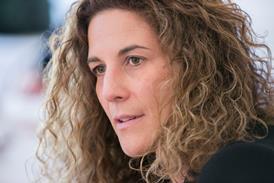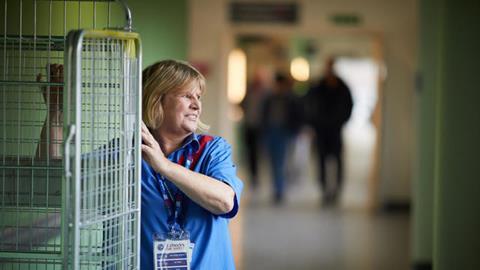Non-clinical staff can make patients’ lives better and safer – and clinicians’ work easier, writes Daloni Carlisle in the run-up to HSJ’s Provider Summit from 19-20 April
There are over half a million support support staff in the NHS – and last year the HSJ Inquiry on Maximising the Contribution of NHS Non-Clinical Staff concluded that they have an important role beyond their immediate job tasks: improving patient experience.
The inquiry concluded: “Organisations should ask all their staff whether they feel they can speak up about safety and quality issues, and if they do, are they listened to – or victimised?”

In association with
Can the domestic who notices that the man in bed 10 has not drunk his tea – and he always drinks his tea – talk about this to the ward sister? Can the housekeeper report the conversation with the lady in bay 6 who is worried she will take the wrong pills at the wrong time when she goes home?
‘If the receptionist does not respond to the distressed patient in front of them, that patient then takes the distress into the clinical consultation’
There is plenty of evidence that patients have more contact with support staff than clinicians. Ruth Evans, managing director of the Patient Experience Network, says: “These are the guys who are in and out of the hospital bays or rooms and accompanying patients as they move around the hospital. What we have observed is that they are the people the patients chat to and they have a really important role to play.”
Non-clinical staff can also improve clinicians’ lives and the clinician-patient interaction. “If the receptionist does not respond to the distressed patient in front of them, that patient then takes the distress into the clinical consultation,” says Ms Evans. “It’s a dynamic that I am not sure many non-clinical staff will have considered.
“I am not sure many organisations will have set things up so that the role of the non-clinical staff is to make sure that everything possible can be done to maximise the opportunity of the clinical consultation.”
People in distress
It is one thing for the odd interaction to lead to change – another to systemise the approach across the organisation.
Wendy Preston, head of nursing practice at the Royal College of Nursing, says one way to achieve this is through training and building non-clinical workers into existing change programmes.
“We are all part of the healthcare family,” she says. “I know as a former ward manager that if I ask the porters what we should do differently to improve things, they have the answers.”
She gives an example of one hospital that has trained security staff to go beyond telling patients not to smoke on hospital grounds by directing them to smoking cessation under the Making Every Contact Count initiative.
She also cites the evidence based Sage and Thyme training programme developed in South Manchester. It trains all levels of staff how to respond to people in distress. To date, more than 50,000 NHS staff UK-wide have been through the three hour module that sits porters alongside consultants.
“It was originally based on NICE guidance on palliative care which said everyone who comes into contact with patients should be able to give psychological support,” says Sage and Thyme business manager Joanne Thomas. “It grew from there with the recognition that these are generic skills that are useful to anyone in healthcare who meets people in distress.”
Training is not enough by itself, says Skills for Health, which has argued that developing the support workforce is one way to meet the productivity and NHS efficiency challenge.
Last year Skills for Health and Unison launched the Our Health Heroes awards to recognise good practice and a working paper on how to create a high quality support workforce. Training, yes; developing new roles, yes; valuing the whole workforce, yes. But above all, it called for concerted action and a “national habit” of developing support worker roles.
‘One of the reasons we were keen to get involved in the HSJ inquiry is that we recognise that occupational pride is not the preserve of clinicians’
Sara Gorton, Unison’s deputy head of health, is all for making better use of the non-clinical workforce to improve patient experience, safety and outcomes but says this must be done in the context of reprofiling roles.
The right thing to do
“One of the reasons we were keen to get involved in the HSJ inquiry is that we recognise that occupational pride is not the preserve of clinicians. All people who work in the NHS feel pride and they need to feel that they are an invaluable part of the whole team,” she says. “But at the same time, that needs to be done in a proper framework and with proper job evaluation.”
As Serco starts working on a systematic approach (see story below), Andrew Prince, development director of Serco’s Global Healthcare Centre of Excellence, says it will be important to focus on four key elements: respecting all staff and recognising everyone’s contribution to patient care; providing non clinical staff with the tools and systems to do their jobs well; provide training across all staff groups; and use the opportunity of the STP transformation plans to develop new working models.
“This is going to require attention and it is going to require time,” he says. “But it is the right thing to do for patients and staff.”
A part of the whole team
Support staff can make a significant difference to patient experience, patient safety, clinicians’ job satisfaction and patient outcomes.
This was one conclusion of last year’s HSJ inquiry into maximising the contribution of over half a million non-clinical staff in the NHS.
Organisations such as the RCN, the Patient Experience Network, Skills for Health and Unison agree. They argue that patients and staff can benefit if support staff see themselves as part of the whole team and able to make a real contribution to patient experience, safety and outcomes.
Translating the idea into practice is challenging. There are some pockets of innovation and good practice, but too few organisations are taking this agenda on board and almost no-one is taking a systematic approach.
Serco is one exception and this May will launch a pathfinder programme to provide a blueprint for action across its NHS contracts.
'All part of the NHS family': in celebration of support staff
- 1
 Currently reading
Currently reading'All part of the NHS family': in celebration of support staff
- 2
- 3


























2 Readers' comments